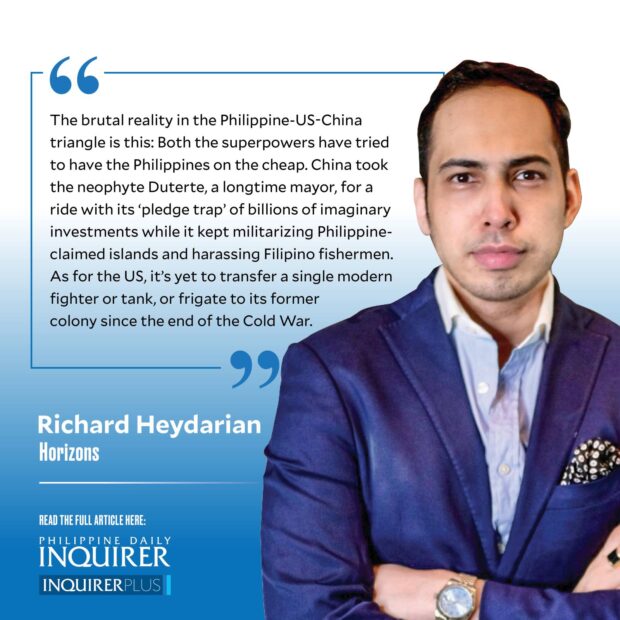Edca: Marcos needs a ‘Goldilocks’ strategy
 The foreign minister of China [Qin Gang] just visited [me recently] and I told him and I assured him that no, these are not … intended to be military bases to attack, to move against anyone … not China, not any country,” declared President Marcos in a recent interview, referring to military sites that will be opened up to US troops under the Enhanced Defense Cooperation Agreement (Edca).
The foreign minister of China [Qin Gang] just visited [me recently] and I told him and I assured him that no, these are not … intended to be military bases to attack, to move against anyone … not China, not any country,” declared President Marcos in a recent interview, referring to military sites that will be opened up to US troops under the Enhanced Defense Cooperation Agreement (Edca).
In a high-profile speech at the Center for Strategic and International Studies in Washington, the Filipino president reiterated that Edca was not designed for belligerence but instead aimed at addressing nontraditional security issues, namely climate change and others. In fact, Mr. Marcos made it crystal clear that the sites under Edca, including additional facilities in northernmost provinces such as Cagayan, won’t be used for “offensive action” and that he won’t allow them to be reduced to “staging areas” for offensive action against other nations, namely China.
If anything, he claimed that Washington had “never brought up the possibility that [Edca sites] be used” against China. At the same time, however, he admitted that rising tensions over Taiwan will inevitably be part of any strategic calculus regarding Edca.
Acknowledging how “tensions across the Taiwan Straits seem to be continuing to increase,” Mr. Marcos admitted that these Edca sites “will also prove to be useful for us should that terrible occurrence (Chinese invasion of Taiwan) come about.” So, this is about deterrence, right?
Earlier this year, in an interview with Japan’s Nikkei Asia, Mr. Marcos was crystal clear: Taiwan is geographically too close and geopolitically too relevant for the Philippines to sit out any potential conflict. Besides, as a US treaty ally, the Philippines, with naval facilities just over 100 nautical miles from Taiwan’s southern shores, will be automatically treated as a hostile nation should China decide to invade the democratic nation.
So, dear reader, how to make sense out of these seemingly contradictory statements? The answer is simple: Mr. Marcos is searching for a “Goldilocks” approach, which ensures that Manila has just enough security cooperation with the US in order to check Beijing’s worst instincts but, crucially, not too much to provoke the Asian superpower or undermine our strategic room for maneuver.
In an interview earlier this year, the Philippine Ambassador to the US Jose “Babe” Romualdez confirmed a hunch I have had about Mr. Marcos, namely how the incumbent has been drawing on his father’s “multivector” strategic playbook rather than Rodrigo Duterte’s pro-Beijing antics. At the height of the Cold War, Marcos Sr. managed to build robust and stable ties with both Maoist China as well as the Soviet Union while maintaining maximal military cooperation with the US, which enjoyed permanent basing access in Subic and Clark.
According to Romualdez, among the chief architects of our foreign policy, Mr. Marcos told him shortly before his election victory: “Everything that my father said and my father taught me—it’s all coming back now.”
“I really wish my father was still around … I really miss him,” Mr. Marcos reportedly told his cousin. One former admiral with sterling patriotic credentials told me something even more astonishing: “It’s not so much of Marcos Jr. having good advisers as them actually catching up with him.”
The brutal reality in the Philippine-US-China triangle is this: Both the superpowers have tried to have the Philippines on the cheap. China took the neophyte Duterte, a longtime mayor, for a ride with its “pledge trap” of billions of imaginary investments while it kept militarizing Philippine-claimed islands and harassing Filipino fishermen.
As for the US, it’s yet to transfer a single modern fighter or tank, or frigate to its former colony since the end of the Cold War. And it’s not clear what Washington, now in the grip of “Made in America” protectionist zeitgeist, can offer in terms of new trade and investments deals to Manila. Vietnam’s trade surplus with the US is almost 10 times larger than our total exports to our sole ally, while Singapore has enjoyed as much as 60 times more American investment inflows as the Philippines. So yes, Mr. Marcos hedges his bets vis-à-vis the superpowers without forgetting that one has been a suboptimal ally and another is a bully in the West Philippine Sea.
rheydarian@inquirer.com.ph




















